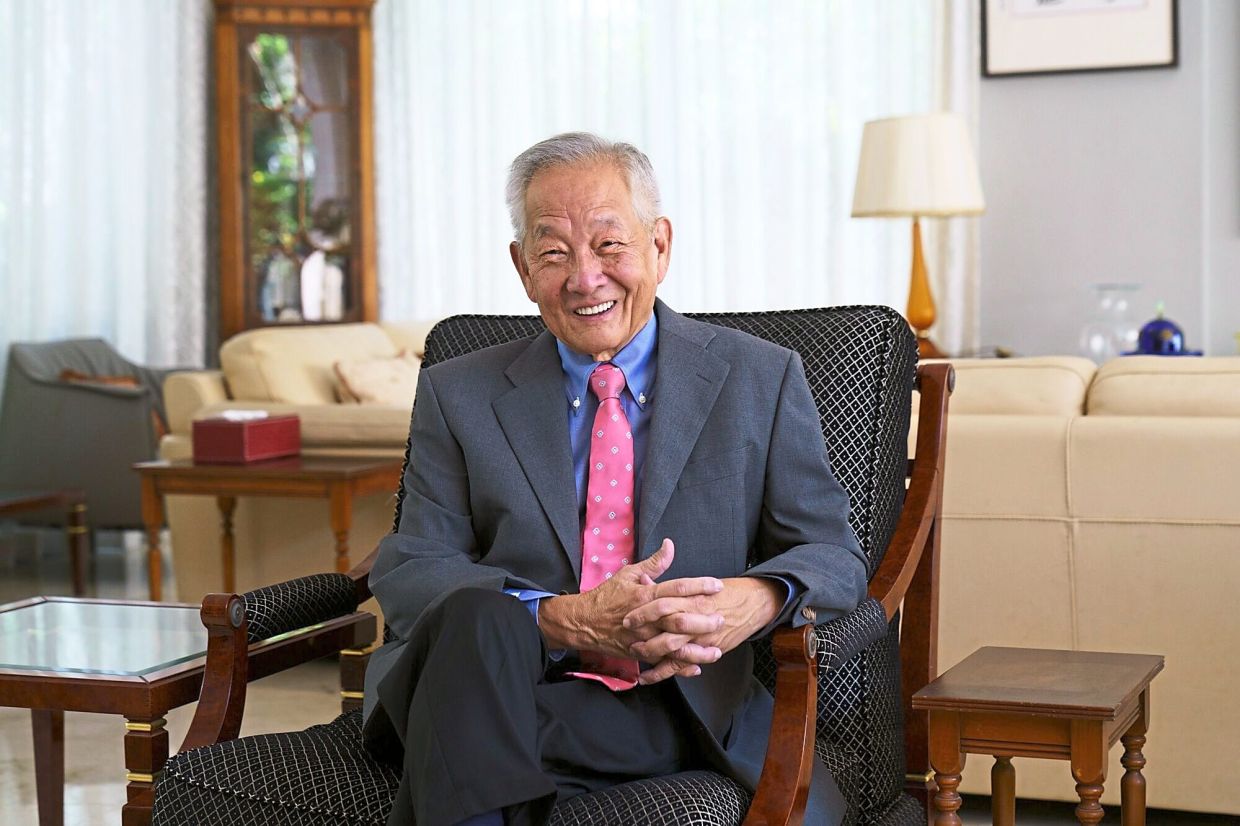
Ng: ‘Singapore has given me so much and I want to do whatever I can, even at this stage of my life.’ — Bloomberg
The former chief investment officer of Singapore sovereign wealth fund GIC Pte and chairman of multibillion-dollar investment firm Avanda Investment Management, Ng Kok Song, plans to run for president, pitting him against his one-time superior, Tharman Shanmugaratnam.
Ng, 75, spent more than four decades working up the ranks of public service until his retirement in 2013 and helped shape the creation of GIC, which is estimated to manage about US$690bil in assets. Over his career he’s built relationships with the likes of hedge fund billionaire Ray Dalio and Gordon Brown, a fellow member of Pimco’s six-person global advisory board.
“Singapore is very fortunate to have two of the best people I know running for president,” said Dalio. “I’ve known Tharman as a great policymaker, finance minister and MAS (Monetary Authority of Singapore) chairman and I’ve known Kok Song as a great investor and leader in his capacity in running GIC.”
A presidential election is due by September and comes at a particularly tricky time for the ruling People’s Action Party, which has long championed its corruption-free image – last week a minister was arrested in connection with a graft probe.
While the role of the president as the official head of state is largely ceremonial and officially non-partisan, it does retain some key powers, including the ability to veto government efforts to draw down on the national reserves – the size of which remains a closely held secret.
The president can also instruct the anti-graft agency to continue an investigation even if the prime minister objects.
Both Ng and Tharman, 66, spent years working closely with Prime Minister Lee Hsien Loong, either helping run or working for the city-state’s central bank and sovereign wealth fund.
Ng acknowledges that he would be seen as “part of the establishment”, but argues that his lack of direct political affiliation makes him an independent candidate.
He never joined the PAP, which has ruled the nation since independence almost six decades ago. The strict criteria to run for president meant that three of the last four elections were walkovers.
“The people of Singapore don’t want a fourth walkover so I’m throwing my hat into the ring,” he said in an interview ahead of his formal nomination. In a later press conference he made clear it wasn’t meant as a challenge to the government. “I’m not standing as a referendum.”
Ng is the third Singaporean to publicly state their intention to run. Tharman, previously a senior minister in the PAP, stepped down from both his role and his membership of the party in June to contest the election.
The only other would-be candidate to come forward so far, George Goh, 63, is a local businessman and former non-resident ambassador to Morocco.
All three face the challenge of meeting the stringent requirements for candidates, which can include working for at least three years as either a senior civil servant, minister or chief executive of a company worth at least S$500mil. And all could yet be rejected from participating.
“A non-establishment candidate could serve as a proxy indicator of popular support for the ruling party leading up to the next general election, due by November 2025,” said Yuen Sin, a senior associate for Vriens & Partners, a Singapore-based government affairs firm. But some may see Ng “as being associated with the establishment due to his GIC background”, she said.
A spokesperson for Tharman did not reply to a request for comment, but the former minister said in his June letter of resignation that he would be “above politics” and “impartial” if he is elected. Goh confirmed via a spokesperson he was planning to run as well.
“If voters are looking for someone with financial expertise and management ability and is at the same time independent and unafraid, his chances are good,” Goh’s spokesperson said.
Ng, the second-eldest of 11 siblings in an impoverished family, is the son of a homemaker mother and fish auctioneer father – all of whom lived in a two-bedroom house with mud floors and a thatched roof when Singapore was a trading port at the edge of British Malaya.
Ng said the family was reliant on the goodwill of neighbours who lent money to pay for textbooks and other needs. When his father lost his voice, he lost his job because he was unable to call out prices for the bidders.
“One particular occasion, mum came home with tears in her eyes and said ‘Kok Song, our neighbours cannot lend us any more money’,” he said.
“That was the moment that galvanised me and I said, as soon as possible, I will do what I can, because I do not want to see my mother cry.”
He eventually gained public service scholarships, studying physics at the University of Singapore and management at Stanford University.
He worked at the Ministry of Finance, the Monetary Authority of Singapore and finally GIC. He was the fund’s first non-expatriate director, eventually retiring as group CIO in 2013.
In 2015 with the backing of GIC and state-owned investor Temasek Holdings Pte, Ng co-founded investment firm Avanda which, despite suffering a “less than 15%” drawdown last year – a good part of which he said has recovered this year. The firm currently manages about US$8.5bil, he added.
Ng remains chairman of Avanda, as well as a director at Temasek-owned asset manager 65 Equity Partners, though he describes his current state as “semi-retirement” – dedicating part of his time to meditation and tending the countless bonsai plants in his garden.
At a press conference after collecting his nomination forms, Ng introduced his fiancee Sybil Lau – a director at Dalio’s family office in Singapore who previously worked at Goldman Sachs Group Inc.
“Singapore has given me so much and I want to do whatever I can, even at this stage of my life,” he said.
Ng said his humble origins were common for Singaporeans of his generation and his rags-to-riches tale is less achievable today.
Citizens in the city-state now worry more about the ability to get high-quality jobs, housing and cars amid an influx of wealth, and some parents pay tutors to help their children enter elite schools.
“We are moving to a higher standard of living, but one escalator is going up faster than the other,” Ng said.
“The lower income people have less opportunity of a good start in life. The starting line is different.” he said.
“We still have a meritocracy, but you might say it’s an inherited meritocracy.”
Still, like Tharman, he’s sceptical about drawing on reserves to fund greater welfare spending. “The more you spend, the less you save for the future,” he said.
And as the founding chairman of the Wealth Management Institute, which trains home-grown finance professionals to join private banks and family offices, he’s a strong supporter of Singapore’s development as a wealth hub.
Even though Ng isn’t a PAP member, he expresses strong ties to the nation’s leaders, including the country’s longest serving premier, Lee Kuan Yew, who Ng says he taught how to meditate.
After deciding to run, he called Lee’s son, the current PM, who he says has done the “right thing” in the ongoing corruption investigation.
If elected president, he said he would offer suggestions as an elder statesman, but would not wish to speak out on controversial issues such as the death penalty or gay marriage, despite stating that his Catholicism “shapes my values in life and the motives of what I do”.
“I think it would be wrong for me to challenge the government openly,” he said, accepting that he would start as an underdog in the campaign and estimating he would have about 35% support.
“But throughout my investment career I strive to outperform the benchmark, so we start at 35 and hopefully we might get 51.” — Bloomberg











































